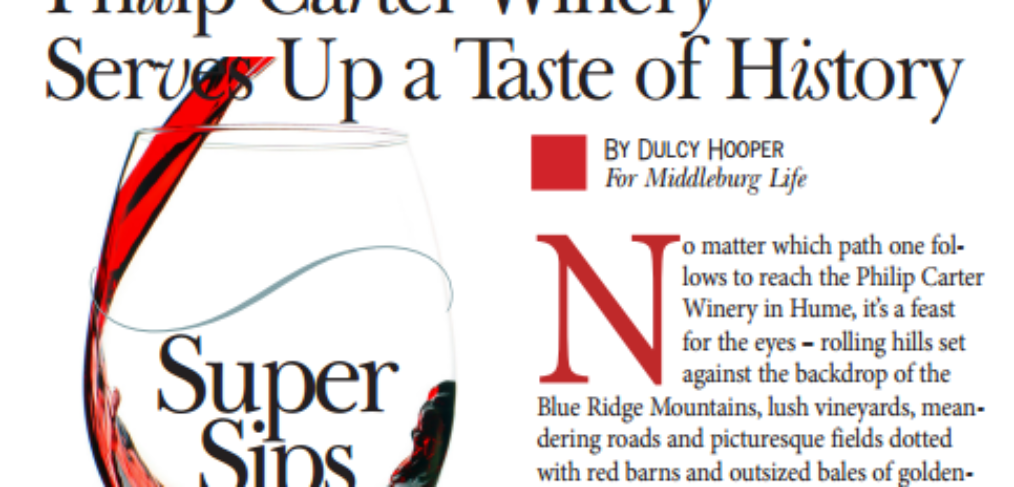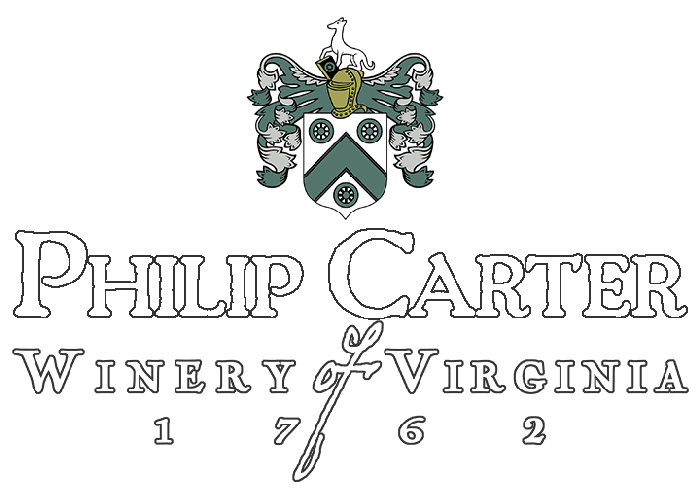
Middleburg Life News Article
Philip Carter Winery Serves Up a Taste of History
By Dulcy Hooper For Middleburg Life
No matter which path one follows to reach the Philip Carter Winery in Hume, it’s a feast for the eyes – rolling hills set against the backdrop of the Blue Ridge Mountains, lush vineyards, meandering roads and picturesque fields dotted with red barns and outsized bales of golden-hued hay.
Virginia’s wine history dates back to the early 1600s, when the first English settlers in Jamestown were buoyed by optimistic hopes that Virginia would become a major source of wine for the British Empire. In 1619, they signed into law a requirement for each male settler to plant and tend to at least ten grape vines, the wine of which could be shipped back to “mother England.”
While the first colonists made wine with grapes grown in England, they soon became determined to grow their own grapes on Virginia soil. Those original efforts met with more failure than success and, at any rate, the booming tobacco trade soon diluted British interest in the possibilities of American wine.
Years later, several of our country’s founding fathers – Washington, Jefferson, Madison – displayed their own deep interest in wine-making, and a desire to avoid dependence on Europe in obtaining fine wine. Jefferson planted European grape varietals at Monticello, and though he tried for more than 30 years, never harvested enough to make wine. After 11 years of effort at Mount Vernon, George Washington also had nothing to show for his efforts.
The Carter family name carries a 250-year legacy as producers of the first internationally recognized wines in America. Charles Carter, the fifth child of Colonel Robert “King” Carter and Elizabeth Landon-Wells, was born in Lancaster County, Virginia, educated in England and returned to Virginia in 1724. In 1759, Carter became the chairman of a committee of the Virginia assembly charged with the question of economic diversification.
Charles Carter and his brother, Landon, had begun growing grapes at Carter’s plantation, Cleve (located in King George County) that year, making wines from both native and European grapes. By 1762, Carter had 1,800 vines growing at Cleve.
Given his commitment to the diversification of the colony’s economy, it was natural that he would have chosen commercial wine-making as one of his proposals for economic reform in Virginia. That year, he sent a dozen bottles of his wine to the Society for the Encouragement of the Arts, Manufacture, and Commerce (now the Royal Society of Arts). The wine was “approved as good wines,” and Carter was awarded a gold medal and acknowledged as the first person to make a “spirited attempt towards the accomplishment of their views, respecting wine in America.”
The following year, in 1763, Royal Governor Francis Fauquier, as acting governor of the Colony of Virginia, certified that the Carter family was successfully growing European vines at Cleve – the first official record of successful grape production with European vines in Virginia. And in 1769, the Carter family was instrumental in the passage of legislation called “An Act for the Encouragement of the Making of Wine.”
In 2008, The Carter family, 239 years later, returned to the production of wine in Virginia when Philip Carter Strother, a direct descendant of the pioneering Carter family, founded Philip Carter Winery. In tribute to the family tradition, Strother planted 1,800 vines in the ground in symbolic remembrance of the 1,800 vines that Carter grew in the 1700s. And in further acknowledgement, two dozen bottles of Philip Carter were shipped across the Atlantic and received by the Royal Society of Arts in the United Kingdom.
One of the winery’s red wines, Nomini Hall Cabernet Franc, traces its name to the home of Robert Carter III, grandson of Robert “King” Carter and Charles Carter’s nephew. Robert was known as the “first emancipator,” and was renowned for his forward thinking in the freeing of 509 slaves in 1791.
The wine industry has grown dramatically in the commonwealth — by some counts, there are now over 275 wineries, making Virginia the sixth largest wine region in the country. Philip Carter Winery is situated on 27 acres at 4366 Stillhouse Road in Hume.
Wine tastings include a sampling of eight wines, from a 2014 Viognier to Sweet Danielle, a dessert wine. An “off-dry” wine is named after Governor Fauquier (although it is a bit of misnomer since Francis Fauquier (1703-1768) served first as Lieutenant Governor of Virginia and was later an acting governor.
The rich history of Philip Carter Winery and its lush surroundings make for a very smooth finish indeed.
See the full article in Middlebureg Life here.
